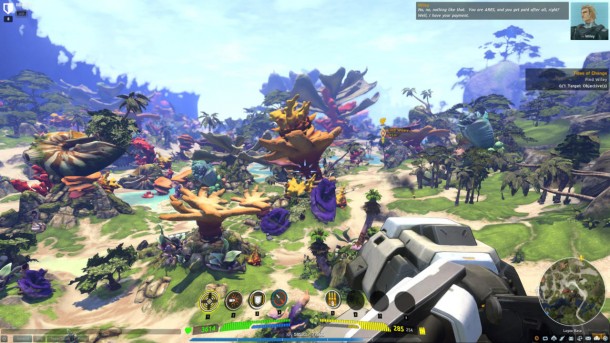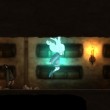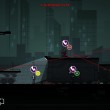Firefall Review
I know that Firefall is a massively multiplayer online game, because my first steps in it are dogged by another human player who deliberately places himself--for the better part of an hour--directly in front of my face any time I stand still. I know that Firefall is also a shooter, because any screen space not immediately occupied by this most ancient of trolling rituals is devoted to a very large gun, and this gun is the sole consignee of that all-important left mouse click. And I know that Firefall is a role-playing game, because my quests involve traveling to far-flung fields and perforating ten of whatever I find there.
That's a bit glib, I know. But would that I could leave it at that. Because while it's true Firefall doesn't outright botch its social scene, shooting, or role-playing elements, each is marked by that perfunctory sort of execution that always defies criticism. There's nothing fun or thought-provoking about designating these things "standard," so let's table them for the moment and instead talk about the thing I prefer to spend most of my time in Firefall doing: climbing.
Climbing won't make any back-of-the-box features list, and not just because the free-to-play Firefall is only distributed digitally. Here, the action has that unrehearsed, clumsy manner of games where climbing is included but not quite "designed," like in Borderlands with its trash heap jungle gyms, or Skyrim's mountainsides that have to be scaled with a sort of zigzag humping motion. Like the former game, Firefall confers a floaty, powerful jump (here bolstered with a jetpack), and like the latter, it offers plenty of alluring heights to test it against. Looming crags, giant coral formations, and neo-futurist superstructures litter the horizon, practically begging to be scaled. Of course, Skyrim and Borderlands nestled Easter eggs in the promontories and nooks of their open worlds, items and secrets that acted as an assenting nod to the player's vagabond explorations. By contrast, if you reach the top of a giant mountain in Firefall, or the depths of some strange and glimmering cave, you might find at best a few cast-away assets: a desk, or maybe a crate. As developer nods go, that's almost imperceptible.
But at such heights, you can get a good view of "The Melding," a towering, weirdly inert cloud wall that fences in the playing populace, and the Arclight, the giant, crashed spaceship that serves as the other grand monument to Firefall's stillborn lore. You and the rest of the protagonists are on Earth, ostensibly, though creative license has run roughshod over the topography and filled the beaches and jungles of Brazil with bulbous, otherworldly rock formations and oversized nautilus shells. The planet's been ravaged by meteors and aliens in turn, and the last dregs of humanity are staking out a milito-corporate lifestyle in the fringes of the tropical wilds--Borderlands again, by way of Halo.
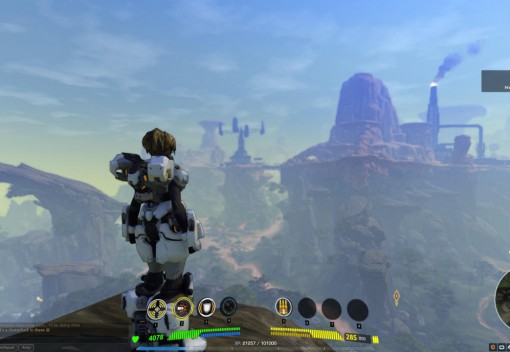
The action has that unrehearsed, clumsy manner of games where climbing is included but not quite "designed."
From the cel-shaded, intermittently quirky cast of quest-givers and their predilection towards remote communication (even when standing next to you), to the lazy twang of the ambient soundtrack, Gearbox's shooter feels just a bit too present. Even the game's mission-giving job board--one of the basest, most ham-handed conventions to be found in modern video games--makes an appearance, playing its usual role of making saving the world feel like punching in at an assembly line job. Grab a ticket, kill [number] of [bandits/wildlife/aliens], report to [location], click on [object], collect [rewards].
Other than shooting, of course, the particulars of your job are dependent upon your selection of battleframe (mechanical exoskeletons are the new future's flying cars), which serves as your traditional MMOG class. I picked the Dreadnaught, the game's euphemism for "tank," but the decision really only amounts to a bit of garnish on the shooting drill all classes partake in: line up the enemy in your crosshairs and press the mouse button until the red bar symbolizing its joie de vivre wanes. Each class gets a smattering of more specific hotkey abilities, but I found myself employing those more out of desire to speed things along than to save my hide. Forget a need to group with other players--there simply isn't enough risk in the greater part of Firefall to warrant it. Most enemies aren't equipped with the smarts to step away from incoming gunfire, let alone process your ability to jetpack to high ground or a few hundred feet away. Even if you manage to die, the only consequence is the long jog back to the battlefield.
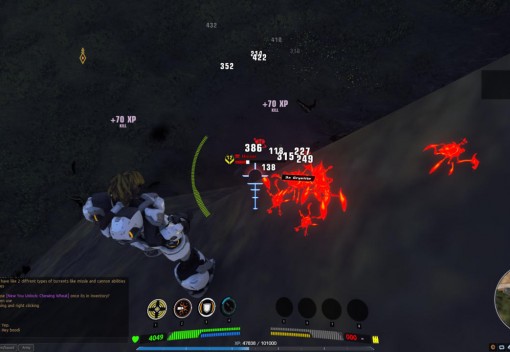
If you can't entertain yourself by clambering around the environment to line up a nice screenshot, then this remediation of rates becomes the salient feature of Firefall. The game is a cold war against the extra seconds, minutes, and hours that are cast in front of you to turn the eye towards the real-money marketplace. If you want to craft items, you need to pay your tithe in either time or dollars, but the more efficient player sees that mission rewards supersede anything you could create anyway. Even savvier players might eschew the missions entirely, to better focus on the pop-up side-quests that can be turned in a bit quicker, without any of that tedious exposition.
While there isn't anything inherently wrong with a free-to-play model, it does stretch what would otherwise be a once-a-month decision to re-up a subscription into a perpetual state of cost-benefit evaluation. It's hard to invest in lore that's so inextricably tied to the grind of missions or side-quests, hard to suspend your awareness of that grind when you're awash in constant pitches for boosters and special unlocks. A purchasable vehicle might mitigate the dreary 1,200m hike between mission markers, but a better game wouldn't have the dreary hike in the first place. I could avoid all that for a time, and maybe do some climbing, but you always have to come down eventually. In Firefall, there isn't much waiting for you when you do.

